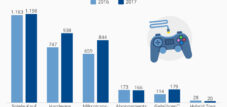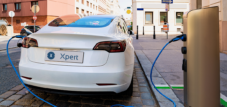Published on: June 18, 2025 / update from: June 18, 2025 - Author: Konrad Wolfenstein

Surprising turn on the e-car market: German car manufacturers take the lead-electromobility in change-creative image: xpert.digital
German carmakers completely conquer the E-Auto Top Ten for the first time
Historical breakthrough: All ten most popular electric cars come from Germany
After months of the crisis, the German automotive industry experiences a remarkable upswing in the field of electromobility. The current figures of the Federal Motor Transport Authority (KBA) for the period January to May 2025 show a surprising development: For the first time in the history of the German automotive market, only German manufacturers and their subsidiaries demonstrate the complete top ten in the new electric car registrations. This development marks an important turning point at a time that was previously shaped by economic challenges, breaking sales figures and general restraint of consumers.
The automotive industry in Germany has been experiencing a profound transformation for some time. The transition from conventional combustion engines to electrical drives presents manufacturers with enormous challenges. High investments in new technologies, production changes and the establishment of new supply chains are financially burdened by companies. At the same time, the industry is fighting with a weakening economy, increasing production costs and increasingly intensive global competition, especially by Chinese manufacturers.
The VW Group dominates the top positions
At the top of the new registration statistics are three models from Volkswagen. The VW ID.7, the flagship of the electrical ID family, leads the ranking with impressive 15,615 new registrations. This model records a phenomenal growth of 993 percent compared to the same period last year. ID.7 has established itself as a popular choice in the upper middle class since its market launch and convinces with its combination of reach, comfort and the latest technology.
In places two and three, other models from the ID family follow: The ID.4 together with its coupé variant ID. These numbers underline the successful electrical strategy of the Volkswagen Group, which consistently relies on the expansion of its electrical model range.
The dominance of the VW group continues in the following places. The ŠKODA ENYAQ, an electric SUV based on the same MEB platform as the ID models, reaches fourth place with 11,051 new registrations and growth of 51 percent. The sporty positioned Cupra Born completes the top five with 8,585 units and a considerable increase of 90 percent compared to the same period last year.
German premium manufacturer with a strong presence
The German premium manufacturers BMW and Mercedes-Benz are also strongly represented in the top ten. The BMW X1, which is available with both conventional and electric drives, proves sixth place with 8,510 new registrations and records growth of 40 percent. The Mercedes E-Class follows in seventh place with 8,036 units, whereby there is a slight decrease of 2 percent-the only negative value in the top ten.
The BMW 5 Series follows with 7,982 new registrations and an impressive growth of 105 percent. The ŠKODA Elroq, a new electric compact SUV, can be found in ninth place that has only been on the market since January 2025 and can already book 6,957 new registrations. The top ten are rounded off by the Audi A6 e-tron, which occupies tenth place with 6,287 units and spectacular growth of 247 percent.
Tesla and Chinese manufacturers lose ground
The significant decline in Tesla is particularly remarkable in this development. The American electric car pioneer, who for a long time dominated the European and German market, can only be found in 18th place with its bestseller Model Y. Tesla's sales figures broke up by dramatic 62 percent compared to the same period in the previous year. This development marks a significant turning point in the competition for supremacy on the electric market.
Chinese manufacturers such as BYD, who celebrate enormous successes in their home market and expand worldwide, could not be placed in the top 20 of the new registrations in Germany. Despite intensive efforts to gain a foothold on the European market, the sales figures of Chinese electric cars in Germany have so far remained behind expectations. BYD was able to sell a total of 2,791 vehicles in Germany from January to April 2025, which corresponds to a considerable increase of 385 percent compared to the previous year, but this is not yet sufficient for placement among the best -selling electric cars.
Technological innovations as the key to success
The success of the German manufacturers is based on continuous innovations and the consistent further development of their electric vehicles. The VW ID.7, the most successful electric model in Germany, convinces with a range of up to 700 kilometers according to the WLTP standard and the latest technology. The vehicle not only offers impressive electrical performance, but also a well thought -out overall concept with a generous space and innovative comfort functions.
The ŠKODA Elroq, one of the latest models in the top ten, also demonstrates the technological competence of the German automotive industry. The compact SUV is based on the modular e-drive kit of Volkswagen AG and is offered in various performance levels. The most powerful version, the ElroQ RS, has a system output of 250 kW (340 hp) and accelerates from 0 to 100 km/h in just 5.4 seconds. With a WLTP range of up to 580 kilometers and a maximum loading capacity of 185 kW, the ELROQ sets new standards in its segment.
The Audi A6 e-tron, which is one of the fastest growing models with growth of 247 percent, is based on the new Premium Platform Electric (PPE) and, thanks to 800-volt technology, offers super fast charging and a range of more than 750 kilometers. This technological advances make German electric vehicles more and more suitable for everyday use and more attractive for a wider customer class.
Challenges despite positive development
Despite the gratifying development in the top models, the overall market for electric vehicles in Germany remains tense. The loss of the state purchase bonus at the end of 2023 led to a noticeable slump in demand. Originally, electric car buyers were to receive a grant of up to 4,500 euros by the end of 2024, but due to household constraints, the funding was ended prematurely. Industry experts then feared a decline in up to 200,000 electric car sales in Germany for 2024.
Another obstacle to the broader acceptance of electric vehicles remains the comparatively high purchase price. Without government funding, electric cars are significantly more expensive for many potential buyers than comparable models with an internal combustion engine. In this context, the ADAC criticized that only three electric vehicles are available under 30,000 euros on the German market, which limits accessibility for wider sections of the population.
The charging infrastructure also remains a critical factor for the success of electromobility. Although the network of charging stations is continuously expanded, there are still gaps, especially in rural regions. In addition, the charging speeds and billing systems vary greatly, which can affect user experience.
The role of the automotive industry for the business location of Germany
The German automotive industry is a central pillar of the German economy and an important employer. According to Hildegard Müller, President of the Association of the Automotive Industry (VDA), Germany is the “European Heart Chamber of E-Auto Production and the second most important e-location worldwide”. Keeping and expanding this position is crucial for the future viability of Germany.
Hildegard Müller, born in Rheine in 1967, has been at the head of the VDA since February 2020. With her extensive experience in politics and business- she was a state minister in the Federal Chancellery and chair of the main management of the Federal Association of Energy and Water Management- she represents the interests of the German automotive industry in a period of profound change. Your expertise is particularly valuable in the current phase in which the industry faces enormous challenges.
The transformation towards electromobility has far -reaching effects on employment in the automotive industry. Since electric vehicles have fewer complex drives and require fewer work steps in production, experts predict an inevitable job cuts. This process has already started: Large suppliers such as Bosch, ZF Friedrichshafen and Continental have announced plans to reduce several ten thousand positions.
Global competition and geopolitical challenges
The German automotive industry is in intensive global competition, especially with manufacturers from China and the USA. Chinese companies such as BYD have already taken the management of electric vehicles in their home market and are now increasingly pressing the European market. BYD has expanded its range of model in Germany and, in addition to the SUVS Atto 3 and Tang, now also offers the compact SUV ATO 2, which is specially developed for Europe, which is available according to discounts from 29,990 euros.
The geopolitical situation and possible trade conflicts represent further risk factors. Both the USA and China could raise tariffs on German car imports, which would affect several hundred thousand vehicles built in Germany. This uncertainties make long -term planning and investment decisions of the companies difficult.
At the same time, the transformation to electromobility also offers opportunities for the German automotive industry. The development of new technologies such as solid batteries or wheel hub engines could lead to competitive advantages. There are also promising approaches in the area of autonomous driving: At the end of 2024, Mercedes received approval to offer its motorway pilots up to a speed of 95 km/h, and is therefore one of the first car manufacturers in addition to BMW to offer a self -driving system on German highways.
Future prospects and strategies
For the future of the German automotive industry, it will be crucial to find the balance between traditional strengths and innovative technologies. Manufacturers must continue to invest in the development of more efficient and inexpensive electric vehicles in order to address wider customer shifts. At the same time, you have to adapt your production capacities and develop new business models to meet the changed market conditions.
The Association of the Automotive Industry (VDA) assumes that in 2025 around 666,000 electric cars will be re -approved in Germany, which would correspond to growth of 75 percent compared to the previous year. In the “electric cars”, under which the association summarizes both battery-electric cars and plug-in hybrids, an increase of 53 percent is expected to around 873,000 new registrations. These forecasts indicate a positive development, even if the overall market with the expected 2.8 million new registrations would continue to be about a quarter below the level of the pre-crisis year 2019.
In order to meet the stricter CO2 fleet limit values from 2025 and avoid fines, an electric car content of about a quarter of the total sales is generally considered necessary. With a forecast share of 23.8 percent, this goal would be almost achieved. However, this proportion must not only be achieved in Germany, but across Europe, which also increases the challenge.
Model offensive and price strategies
In order to further increase the sales of electric vehicles, German manufacturers rely on a broad model offensive and adapted price strategies. Experts expect the prices between burners and electric cars to be align in 2025, which could be at the expense of the profits of the corporations and their suppliers, since electric cars are less profitable than burners because of the expensive batteries.
Volkswagen and its ID family already have a wide range of electric vehicles on offer, which covers various market segments. The ID.3 addresses a broad customer class as a compact model, while ID.4 and ID.5 operate the growing SUV segment. With ID.7, VW now also offers an electrical alternative in the upper middle class, which can score especially for business customers and frequent drivers.
The subsidiaries Škoda, Cupra and Audi also continuously expand their range of electric vehicles. The ŠKODA ELROQ, a compact electric SUV that has only been on the market since January 2025, has already established itself as a success model. With a range of up to 580 kilometers and various power levels, it offers an attractive alternative to conventionally powered SUVs.
The Audi A6 e-tron, which is based on the new Premium Platform ELECTRIC (PPE), sets new standards with its 800-volt technology. With a maximum charging capacity of 270 kW, the batteries can be recharged in around 25 minutes to 80 percent. This technological progress helps to overcome one of the main obstacles for the acceptance of electric vehicles - the loading time.
A turning point for the German automotive industry
The current new numbering figures mark an important turning point for the German automotive industry. After years of uncertainty and challenges, the success of electric vehicles shows that German manufacturers are able to successfully adapt to the changed market conditions and to compete with international competitors.
The dominance of German brands in the top ten of new electric car registrations is a clear signal for the industry's innovative strength and adaptability. The success of the Volkswagen Group, which takes up a leading position in the electric car market with its various brands and models, is particularly remarkable.
Nevertheless, there are considerable challenges. The elimination of state funding, continuing economic weakness and intensive global competition require continuous adjustments and innovations. The transformation of the automotive industry will have far -reaching effects on employment, production structures and business models.
In the future, it will be crucial that the German manufacturers further expand their technological management position and at the same time offer more affordable electric vehicles for wider customer classes. This is the only way to secure the German automotive industry in the long term as the “European Heart Chamber of E-Auto Production” and successfully design the transition to sustainable mobility.
The current numbers give rise to careful optimism. They show that the German manufacturers have accepted the challenges of electromobility and are on the right track to claim their leading position in the global automotive industry in the age of electromobility. The success of the German electric cars is not only important for companies themselves, but also for the business location of Germany and the thousands of jobs that depend directly or indirectly on the automotive industry.
Suitable for:
Your global marketing and business development partner
☑️ Our business language is English or German
☑️ NEW: Correspondence in your national language!
I would be happy to serve you and my team as a personal advisor.
You can contact me by filling out the contact form or simply call me on +49 89 89 674 804 (Munich) . My email address is: wolfenstein ∂ xpert.digital
I'm looking forward to our joint project.











